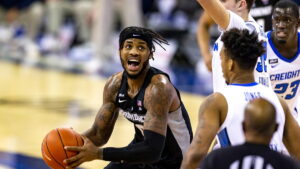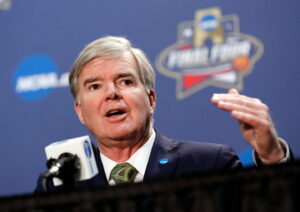Tag: Mark Emmert
College Endorsements
by The Cowl Editor on September 30, 2021
Friar Sports
What It Means Now for College Athletes
Ben Bilotti ’23
Sports Staff
On Jun. 30, the NCAA approved a policy known as names, images, or likeness (NIL), a deal that will allow college athletes to profit off their name, image, and likeness.
The president of the NCAA, Mark Emmert, was quoted saying, “This is an important day for college athletes since they are now able to take advantage of name, image and likeness opportunities.”
Since the approval of the policy, many college athletes all over the country have profited in some way or another. Many athletes are partnering with local small businesses while others are creating their own merchandise lines or getting involved in commercials.
Jackson State defensive end Antwan Owens was the first to take advantage of the new policy. As soon as the clock struck midnight and the policy was official, Owen signed a deal with Three Kings Grooming.
Some believe female athletes will have more chances to profit off of NIL given many of their impressive social media followings.
Hanna and Haley Cavinder, known as the Cavinder twins, are a perfect example of female athletes who have a major opportunity to make the most of the NIL policy.
Across TikTok and Instagram, the twins collectively have over 3.8 million followers. They have since been able to partner with Boost Mobile and Six Star Pro Nutrition.
LSU gymnast Olivia Dunne is another female athlete who is expected to make a lot of money from the NIL rule changes.
She has 4.4 million followers on TikTok and 1.3 million on Instagram. Dunne is likely going to earn more compensation than any other athlete.
In August, Dunne signed to be represented by WME Sports. Not long after, on Sept. 14, she announced her first NIL Brand Deal with an activewear company, Vuori, with whom she will take part in marketing campaigns over the next two years.
The Vuori deal includes promotional photoshoots, social media takeovers, and in-person events. It is rumored that the deal is in the “mid six-figures.” Many believe Dunne will be the first student-athlete to reach $1 million in NIL deals.
Providence College is doing their part to help student-athletes reach their full earning potential.
On Aug. 8, the Providence College Athletic Department launched a program to assist athletes with education, protection, and monetization of their name, image, and likeness.
The platform is called AdvantEdge and is powered by Opendorse. The platform will be administered through the Friar Edge student development program.
PC’s Women’s Basketball head coach Jim Crowley said, “Our players will be positioned well in this new environment with the education and resources they need to build their brand and take advantage of the opportunities that are ahead of them.”
PC’s Men’s Basketball head coach Ed Cooley also stated how pleased he was with the addition of Opendorse.Providence College Men’s Basketball center Nate Watson is a student-athlete who is in a great position to be compensated for his NIL.

Watson has over 51,000 followers on Instagram and over 680,000 followers on TikTok. Watson has already partnered with PSD Underwear and Playmaker. He has also launched an account on Cameo where anyone can request a personalized video from Watson.
The new NIL rule changes are a huge step in the right direction for student-athletes.
Even athletes from smaller schools have the opportunity to be compensated and partner with brands.
These partnerships are expected to be beneficial to both student-athletes and the brands with which they sign; student-athletes will be compensated for their hard work and companies will expand their name-recognition.
The future is bright for NCAA athletes.
Editor’s Corner: New NCAA Rule Can Be Harmful to Student-Athletes
by The Cowl Editor on November 7, 2019
Friar Sports
by Meaghan Cahill ’20
Sports Coeditor
The issue as to whether or not college athletes should get paid has been a heavily debated topic in both the sports and academic worlds. On Oct. 29, the NCAA started the process that will answer the question once and for all.

The NCAA’s top governing board voted unanimously to permit the 460,000 students participating in collegiate athletics the opportunity “to benefit from the use of their name, image, and likeness in a manner consistent with the collegiate model.”
This decision comes just weeks after the NCAA called California’s Senate Bill 206 “Fair Pay for Play Act”—which calls for student-athlete compensation and representation from both state and private universities—“unconstitutional” and an “existential threat.”
On the initial motions to put this new rule into effect on college campuses across the country, NCAA President Mark Emmert said, “The board’s action…creates a path to enhance opportunities for student-athletes while ensuring they compete against students and not professionals.”
Adamant that the student-athletes are not to become employees of the schools at which they play, the NCAA’s new rule only allows student-athletes to enter into contracts for merchandise and endorsements; they are in no way allowed to be paid for their athletic performance in efforts to keep up with the amateur aspect of college athletics.
However, it can be argued that despite the attempts made by the NCAA, all amateur aspects of play have been wiped off of the table with an alarming force, and, while the intent is to enhance the student-athlete experience, the new law will become nothing more than a hinderance on their collegiate career.
To expand upon Emmert’s words, student-athletes will be competing against professionals. Typically, the athletes that big-name companies look to endorse and create merchandised gear for are the ones who they believe have the best shot at a professional career. No longer will athletes be looked at as amateurs, but, rather, the ones who are able to attract deals off of their name, image, and likeness will be singled out more so than they most likely would have been prior to an endorsement deal.
Due to this professional mentality that will naturally arise, the experience of the student-athlete is put at risk because the pressure on them to perform well will only be intensified. While they may not be making deals based on their actual play, it is their playing skills that will get them recognized by any type of company. There is a great risk for high levels of stress amongst student-athletes because now, not only will they have to perform well for the team to win, but they will have the added pressure of performing exceptionally well each game so that they do not lose whatever endorsement deals they may have struck.
While much of the law still has to take a clear, definitive shape, there are already too many issues that can (and will) arise with its implementation. Instead of conforming to California’s Senate Bill, the NCAA should maintain their initial response and look to protect all of their student-athletes from the dangers that this new law can impose on them.
